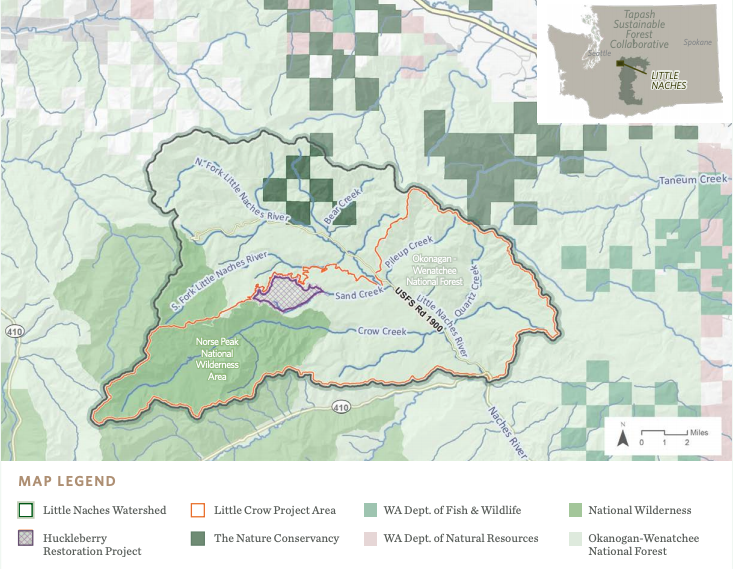
Little Naches Working Group
About 10 years ago the Tapash Collaborative and the US Forest Service (USFS) were awarded funding through the Collaborative Forest Restoration Act for restoration in the Little Naches Watershed. The Little Naches Working Group was born under the umbrella of Tapash to help the USFS connect with stakeholders who have a wealth of local knowledge and deep commitment to this watershed.
- 2019:
- Tapash was awarded funding from WA DNR to create an engagement plan and work plan for how to move forward with restoration in the Little Naches Watershed. Over three workshop sessions, an outside facilitator developed A Collaborative Work Plan for the Little Naches that will guide the development of the next large integrated restoration project for the Little Naches Watershed.
- 2017:
- An environmental assessment of the lower portion of the Little Naches Watershed, the Little Crow Restoration Project area, resulted in the signed decision for the Huckleberry Restoration Project. This decision approved 711 acres of vegetation treatments (commercial harvest, non-commercial small tree thinning, and prescribed burning) along with associated road upgrades, road decommissioning, and gate installation to increase forest resiliency, restore aquatic resources, and maintain public access in the Little Naches Watershed. The Working Group is requesting that the proceeds from this stewardship timber sale are used for further restoration projects in the Little Naches watershed.
- 2014:
- The Little Naches Working Group grew to about 40 members and established a steering committee made up of one representative from each of the six subgroups: Vegetation, Special Use Permits, Economics, Recreation, Wildlife, and Aquatics.
- 2013:
- The Little Naches Working group is formed to work with USFS to understand each other’s needs and perspectives. Together, we identify resource concerns, suggest projects, and recommend restoration priorities.
Accomplishments in the Little Naches Watershed
711 Acres
of elk forage and huckleberry habitat enhanced through a combination of prescribed fire and mechanical thinning.
3 Miles
of unmaintained roads decommissioned to improve stream connectivity.
1.5 Miles
of critical habitat restored for bull trout and steel head by log placements in streams.
$3 Million
or more of net revenue (retained receipts) that will be directed to future restoration projects.
5 Years
of baseline wildlife monitoring.
1,000 Hours
donated by volunteers ANNUALLY, to restore & improve motorized system trails.
630 Jobs
supported directly and indirectly from timber management.
300 Acres
of invasive plants controlled
5,248 Acres
acquired by USFS since 2013
47 Miles
of roads improved
35 Groups
of rare plants protected
Want to know more about the Little Naches?
Check out the links below!
